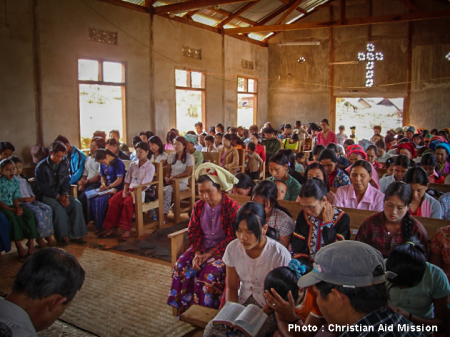Myanmar: Priests, Nuns, Christian Teachers Expelled Amid Crackdown

A persecution watchdog group has said that it's profoundly concerned about the ongoing removal of priests, nuns, and Christian teachers in Myanmar's northern Shan State.
UCAnews.com reported that last week two Salesian priests, three nuns from the Missionary Society of St. Paul, and three lay teachers were all expelled by the United Wa State Army that controls the region.
In September, another priest, five nuns, and six teachers who moved to the area after 1992 were also ordered to leave.
"The scale, suddenness and severity of this crackdown is profoundly concerning. We urge the international community to monitor this situation closely and consider what action could be taken to protest at this repression and protect the Christians in UWSA-controlled areas," said Benedict Rogers, Christian Solidarity Worldwide's East Asia team leader.
Father Raymond Than, one of the expelled priests, revealed that the clergy members were only allowed to take what they could carry when told by the UWSA to leave.
Than explained that he arrived in the state's Lashio town on Oct. 15, only to be met with the rebel army's expulsion orders. The priest insisted that believers have done nothing the merit such actions.
"We are not problem-makers," he insisted.
The rebel army's orders follow news that as many as 92 Christian pastors were detained as part of a crackdown on religious leaders, while 50 churches were shut down.
The USWA has been investigating churches and clergy since issuing a six-point statement on Sept. 6, and has ordered all churches built after 1989 to be destroyed.
Christians have said that they have been forbidden from worshiping not only at churches, but even at their own homes.
Followers of Christ make up about 30 percent of Wa's 450,000-strong population, while others observe Buddhism, animism, spirit worship and Islam.
CSW's Rogers said that the UWSA seems to be acting at least on some level on the influence of Chinese authorities, who themselves have cracked down on Christianity and other forms of religion in China.
"Religious and ethnic minorities in Burma are already facing a rise in persecution at the hands of the Burma Army and a militant Buddhist nationalist movement, but this particular crackdown appears to be related more to China's influence, with economic, security and political interests at play," Rogers suggested.
"If Burma is to have any chance of peace and any hope of democracy, it must respect basic human rights for all its people of all religions and ethnicities, and protect freedom of religion or belief for all," he continued.
"Violations of freedom of religion or belief, whether by the Burma Army, militant Buddhist nationalists, ethnic armed groups or by China extending its repression beyond its borders are unacceptable and must be held accountable."





















